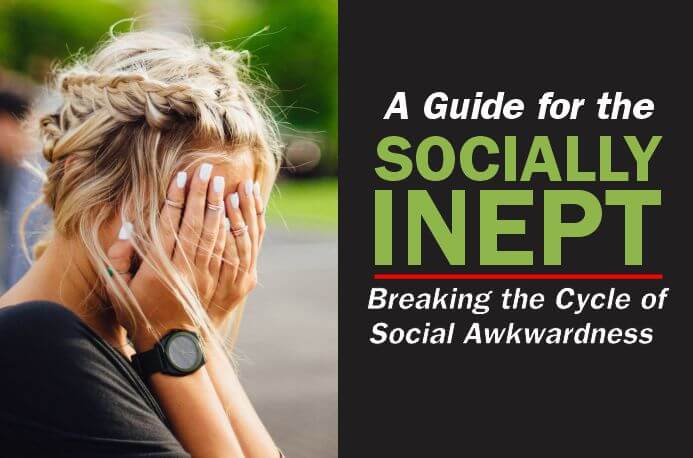Discover strategies to overcome social awkwardness and thrive despite feeling socially inept. Embrace your unique social style and build meaningful connections.
With practice and guidance, it is possible to overcome social ineptitude and improve social skills to become more comfortable in social situations.
I remember before my teenagerhood, and well into my 20s, my introversion overlapped with social awkwardness and social ineptitude.
I was timid and jittery and avoided social situations like the plague, not to mention speaking in public.
However, I overcame this dilemma after my mid-20s with confidence that is running over.
In this unusually long article, I will take you through my journey on how I stopped being socially inept, and how you, too, can hone your confidence and become socially competent.
Socially Inept: Meaning and Definition
Social ineptitude refers to a lack of social skills or an inability to effectively navigate social situations.
People who have this problem, like me, may struggle with basic social interactions, such as starting a conversation, maintaining eye contact, or interpreting nonverbal cues.
They may also have difficulty understanding social norms and expectations, which can lead to awkward or inappropriate behavior.
Social ineptitude can have a significant impact on a person’s life, both personally and professionally.
It can lead to feelings of isolation, anxiety, and low self-esteem, as well as difficulties in socializing, building relationships, and advancing in the workplace.
Socially Inept and Socially Awkward: What’s the Difference?
Socially inept refers to a person who may lack social skills or experience and may not know how to properly interact in certain social situations.
This may not necessarily be due to a lack of desire to socialize, but rather a lack of knowledge or confidence.
On the other hand, socially awkward refers to a person who tends to behave in a way that makes others feel uncomfortable or awkward.
This can be due to their lack of social skills, inappropriate behavior, or difficulty reading social cues.
Recommended: Body Language: The Power of Nonverbal Communication
Importance of Social Skills
Social skills are important for several reasons. First, strong social skills allow for positive interactions with others, leading to better relationships and a more fulfilling social life.
Secondly, social skills are essential in the workplace as they help to build and maintain professional relationships, increase teamwork and collaboration, and improve communication with colleagues and clients.
Additionally, good social skills can improve one’s emotional intelligence and empathy, allowing individuals to better understand and connect with others.
Social skills are crucial for personal and professional success and play a significant role in one’s mental health and well-being.
Related Posts
What Are Social Cues? Everything to Know
The Importance Of Self-Awareness And Its Improvement
The Proactive Way To Regulate Your Emotions
The Journey to Identity Achievement
Social Intelligence Test: What is social intelligence
Emotional Intelligence: The Key to Success in Today’s World
Social Awareness, Skills, And Ways To Apply Them In Leadership
What Causes People to Become Socially Inept?
Social ineptitude and social awkwardness can have various causes, and it is important to note that these factors can differ from person to person.
Social awkwardness can arise from a combination of factors, including shyness and introversion, low self-esteem and lack of self-confidence, lack of social experience and skills, and anxiety and fear of judgment.
Let’s take a closer look:
Shyness and Introversion
Shyness causes discomfort in social settings; introversion involves a preference for solitude and limited social interaction.
Low Self-esteem and Lack of Self-confidence
Low self-esteem and self-doubt hinder participation in social settings, leading to hesitancy and difficulty expressing oneself.
Lack of Social Experience and Skills
Limited social exposure and lack of skill development cause discomfort, making it hard to understand social norms.
Anxiety and Fear of Judgment
Social anxiety arises from the fear of judgment, leading to excessive self-consciousness and difficulty engaging in social interactions.
Traumatic Experiences
Past trauma, such as bullying, creates distrust and fear, making it difficult to form or maintain social relationships.
Cultural or Language Barriers
Cultural or language differences can create confusion, making it harder to understand social cues and navigate interactions.
Developmental Disorders
Developmental disorders like ADHD can impair social skills, leading to social awkwardness and difficulties in communication.
Genetics
There is evidence that what causes people to be socially inept may have a genetic origin, with certain personality traits and cognitive abilities being inherited.
How Nature vs Nurture Can Cause Social Ineptitude
Nature and nurture both play a significant role in shaping an individual’s personality and behavior.
Social ineptitude can be caused by a combination of genetic and environmental factors.
In this article, we will explore how nature and nurture can contribute to social ineptitude.
Nature
Nature influences socialization through inherited traits and biological factors.
Genetic inheritance can predispose individuals to neurological disorders, speech impairments, or conditions such as autism, which may hinder communication and interaction.
These inherited conditions suggest a genetic role in shaping social ability.
Additionally, hormonal imbalances, such as thyroid dysfunction, hormone irregularities, or neurotransmitter disruptions, can affect mood, cognition, and behavior.
Conditions linked to anxiety or depression may further limit one’s capacity to engage socially.
Together, inherited conditions and hormonal imbalances demonstrate how biological and genetic factors can significantly shape a person’s ability to interact and form healthy social relationships.
Nurture
Nurture shapes socialization through upbringing, experiences, and cultural context.
Parenting style plays a central role, as overprotective, permissive, or abusive approaches can hinder the growth of healthy social skills and confidence.
Social exertion, or lack thereof, also matters; limited exposure to interactions or prolonged isolation reduces opportunities to practice communication and build self-assurance.
Supportive relationships are vital for reinforcing social competence, while their absence weakens it.
Cultural influences further shape behavior, as norms for emotional expression and etiquette vary across societies.
Misalignment with these expectations can create misunderstandings, making it harder to adapt and engage effectively in social situations.
Related: Body Language Guide for Social Conduct
Signs of the Socially Inept and Social Awkwardness
These struggles affect conversation, self-perception, relationships, and awareness of social cues.
Recognizing these signs can help you improve interactions and build stronger social confidence.
Difficulty Initiating or Sustaining Conversations
Socially inept individuals often find it hard to start or maintain meaningful conversations.
They may struggle to identify suitable topics, respond effectively, or keep discussions flowing smoothly.
This hesitation can create awkward silences or one-sided exchanges that make interactions uncomfortable for both themselves and others involved.
Being Overly Self-conscious and Self-critical
When you are overly self-conscious, every interaction feels like a test of how others perceive you.
Constant self-criticism and worry prevent natural communication.
This internal pressure not only blocks confidence but also creates visible nervousness that can discourage deeper social connections with people around you.
Having Trouble Reading Social Cues and Nonverbal Communication
Reading nonverbal signals is essential for smooth interactions, but socially awkward individuals find this challenging.
They might miss subtle facial expressions, tone changes, or body language cues.
These gaps in understanding can cause misinterpretation, leaving conversations strained and leading others to feel misunderstood or disconnected.
Insensitivity
Without recognizing context, socially inept people may unintentionally say things that sound offensive.
They are not always aware of the emotional weight of their words or how others interpret them.
This lack of sensitivity can create tension and distance in conversations and relationships, even when no harm is intended.
Difficulty Forming and Maintaining Relationships
Building relationships requires empathy, communication, and trust.
Socially awkward individuals might struggle to create meaningful bonds, leaving most connections surface-level.
Their discomfort in navigating emotional closeness or misunderstandings often prevents relationships from deepening, which can result in feelings of isolation and loneliness over time.
Lack of Self-awareness
Self-awareness helps you understand how your actions affect others, but socially inept people often lack this.
They may not notice when their words or behavior disrupt interactions, leading to unintended social mistakes.
This absence of reflection hinders growth and makes adapting to social settings more challenging.
Related: Self-Perception: Key to Self-Discovery
Social Awkwardness Signs
Social awkwardness can manifest in various ways that affect communication and relationships.
Recognizing these signs can help in understanding behaviors and finding strategies to build stronger social connections.
Anxiety in Social Settings
People who struggle with social awkwardness may feel nervous or uneasy in group settings.
This anxiety can appear as restlessness, sweating, or avoidance behaviors, making it difficult to communicate confidently and comfortably with others.
Awkward Gestures and Movements
Socially awkward individuals may display physical signs of discomfort, such as fidgeting, stiff postures, or nervous tics.
These gestures often reflect inner tension and can make interactions appear unnatural or uneasy.
Difficulty Making Eye Contact
Maintaining eye contact can feel overwhelming for socially awkward people.
Avoiding direct gaze is a coping mechanism, but it can unintentionally signal disinterest, making communication and connection with others more challenging.
Overthinking or Over-analyzing
A common sign is excessive rumination about conversations or actions.
They may replay interactions in their mind, worry about perceived mistakes, and anticipate negative judgment, which increases anxiety and hinders natural communication.
Preference for Solitude
Many socially awkward people prefer solitude over group settings.
Choosing solitary activities reduces the stress of social expectations, but it can also limit opportunities to practice and develop stronger social skills.
Consequences of Being Socially Inept
Social ineptitude can create challenges that affect different areas of life, particularly relationships, self-perception, and emotional health.
Below are some of the main consequences and how they impact daily living.
Difficulty Making and Maintaining Friendships
Struggling with social ineptitude makes it harder to form lasting friendships.
People may miss social cues, avoid small talk, or find it difficult to build rapport, which limits opportunities for meaningful social connections and companionship.
Feelings of Loneliness and Isolation
Limited social interactions often lead to feelings of loneliness.
Those who are socially inept may avoid gatherings, feel excluded from group activities, and experience a sense of emotional detachment from others around them.
Reduced Self-esteem and Self-worth
Repeated difficulties in social settings can damage confidence.
When individuals internalize failures in communication or connection, they may develop negative beliefs about themselves, leading to feelings of inadequacy, insecurity, and diminished self-worth.
Mental Health Issues
Social ineptitude may contribute to anxiety, depression, or other mental health struggles.
The ongoing stress of social challenges can also increase risks of substance use, obsessive behaviors, or emotional withdrawal, further deepening overall distress.
Difficulty in Dating and Romantic Relationships
Forming romantic bonds can be especially challenging.
People may feel anxious about dating, struggle to communicate affection, or misinterpret their partner’s cues, which can create distance and difficulties in maintaining a healthy relationship.
How the Socially Inept Can Overcome Social Awkwardness and Social Ineptitude
Overcoming social awkwardness and social ineptitude means improving your ability to navigate social interactions and feel more comfortable and confident in social settings.
Recognizing the Need for Change
Self-reflection helps identify how social ineptitude limits opportunities and strains relationships.
Acknowledging these impacts creates motivation for change.
Embracing personal growth means committing to developing better social skills through determination, consistent effort, and a genuine desire to improve social connections.
Developing Social Skills
Improving social skills requires active listening, empathetic responses, and assertive communication.
Recognizing nonverbal cues and adjusting body language make interactions smoother.
Practicing small talk and using conversation starters helps build confidence, making social situations less intimidating and more natural over time.
Building Self-Confidence
Overcoming awkwardness requires challenging negative self-beliefs and replacing them with affirming thoughts.
Setting achievable social goals and celebrating progress boosts confidence.
Support from friends, family, or professionals provides encouragement and guidance, reinforcing growth and resilience in navigating different social situations effectively.
Exposing Oneself to Social Situations
Exposing yourself to social situations involves gradual desensitization to anxiety, starting small and building confidence.
Joining clubs or groups provides safe practice, while actively seeking social opportunities helps expand comfort zones and strengthen communication skills over time.
Tools and Resources for Socially Inept Individuals

Of course, the socially inept can get help and become socially intelligent with little effort or practice.
Here are some resources:
Books and Self-help Resources
Recommendations for Books on Social Skills and Self-improvement: There are various books available that can help socially inept individuals improve their social skills. Some popular recommendations include “How to Win Friends and Influence People” by Dale Carnegie, “The Charisma Myth” by Olivia Fox Cabane, and “Social Intelligence” by Daniel Goleman.
Online Courses and Tutorials for Developing Social Skills: Several online platforms offer courses and tutorials specifically designed to help individuals develop social skills. Websites like Udemy, Coursera, and Skillshare provide a wide range of options to choose from, such as “Overcoming Shyness and Social Anxiety” or “Effective Communication Skills.”
Therapy and Coaching Options
Benefits of Seeking Professional Guidance: Professional therapy or coaching offers personalized support, identifies underlying issues, and provides techniques and emotional support for improvement.
Different Therapy Approaches to Address Social Ineptitude: Cognitive-behavioral therapy (CBT), social skills training, psychodynamic therapy, and group therapy help address social ineptitude based on individual needs.
Support Groups and Communities
Connecting with Others Facing Similar Challenges: Support groups or communities offer a safe space for socially inept individuals to connect, fostering empathy and belonging.
Engaging in Online Forums or Attending Local Meetups: Online forums and local meetups provide opportunities to connect with like-minded individuals, and practice social skills in a supportive environment.
Social Awkwardness Test

A social awkwardness test assesses your social skills and comfort in various situations through questions or rating scales.
It helps identify areas of struggle, such as initiating conversations, maintaining eye contact, or handling small talk.
The test provides insights into your strengths and weaknesses, offering a foundation for personal growth.
It can also assist professionals like therapists in evaluating social difficulties and offering guidance.
The results help you work on improving social interactions and communication abilities.
Conclusion
Socially inept people are normal people who are awkward with social skills. They find it difficult to interact and comport themselves around people.
Social ineptitude is a multifactorial issue with different causation factors. Both nature and nurture interact to create a person’s social skills and abilities.
They can be very active with their families but assume an inept posture in social settings.
Exposing yourself and being competent in social skills would go a long way in solving social awkwardness.
Intense therapy or counseling might need to be administered to ensure individuals have the required skills to establish adequate social relationships.
Frequently Asked Questions
What does it mean to be socially inept?
It means having difficulty with social interactions, understanding social cues, maintaining appropriate behavior, and feeling comfortable in social situations.
Can social ineptitude be improved or cured?
Social ineptitude can improve with practice, therapy, or social skills training, though it may not be completely cured as it can be part of one’s personality.
How can I improve my social skills if I am socially inept?
Improve by practicing social situations, seeking feedback, attending social skills training, and working with a therapist.
What causes social ineptness?
Social ineptitude can be caused by genetics, upbringing, environment, and personal experiences, with social skills influenced by both nature and nurture.
References:
- A Gude to Conquering Social Awkwardness
- 7 Signs Of Socially Awkward People And Solutions
- 57 Tips To Not Be Socially Awkward (For Introverts)
- How To Stop Being Socially Awkward
- How to stop feeling socially awkward? · Making Moves
Pious Clements is the insightful voice behind "The Conducts of Life" blog, where he writes about life ethics, self-development, life mastery, and the dynamics of people and society.
With a profound understanding of human behaviuor and societal dynamics, Pious offers thought-provoking perspectives on ethical living and personal growth.
Through engaging narratives and astute observations, he inspires readers to navigate life's complexities with wisdom and integrity, encouraging a deeper understanding of the human experience and our place within society.
